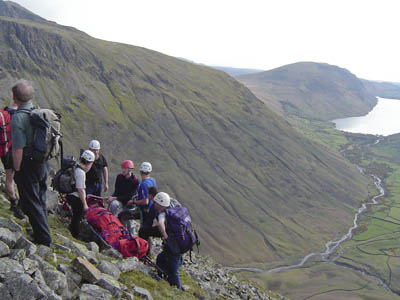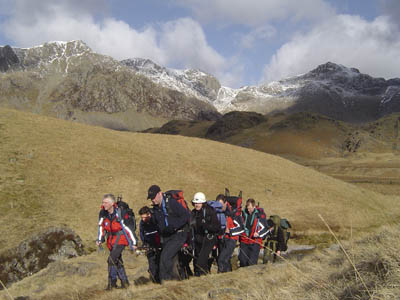
Mountain rescuers at work in the Lake District
Proposed changes by a Government agency could put people’s lives at risk, say mountain rescuers.
Ofcom, the body which oversees radio communications, wants to tighten up the way the radio spectrum is used – a change that could cost rescuers dear. Teams fear any changes will have an effect on how they operate while out on rescue missions.
The bodies which oversee mountain rescue in England, Scotland and Wales are asking their members and supporters to write to Ofcom to make sure the rescue community’s voice is heard. But there is an urgency to the problem – the Ofcom consultation ends on 30 October.
The cause of the concern is Ofcom’s need to ensure the radio spectrum is used efficiently. Market forces have been applied to radio communication, with auctions set up to trade parts of the spectrum and official organisations expected to pay for the use they make of the limited frequencies available. Ofcom’s official jargon for this is Administered Incentive Pricing, and it is taking a fresh look at the whole scheme.
It will come as a surprise to many to learn that when the volunteer mountain rescuers of Britain take to the hills to go to the aid of stricken walkers and climbers, they have radios which use bandwidths allocated to maritime and aircraft users. Normally, they would have to pay to use these parts of the radio spectrum but the Maritime and Coastguard Agency, the official Government body which looks after Britain’s coast and seas, picks up the tab.
Mountain rescuers worry that if Ofcom puts the squeeze on the MCA by, for instance, increasing rates for other parts of the spectrum such as radar, the charities which run rescue teams will be forced to pay for their radio use. Even more worryingly, if frequencies are restricted, there could be more cross-channel interference from other users, endangering the lives of both rescuers and casualties.
This would be a particular danger in large-scale emergencies.
Now, the mountain rescue community, its members, families and supporters are being asked to write to Ofcom to support the MRTs’ case. Key concerns are the way radio communication helps teams preserve life, minimise pain and discomfort of their casualties, get injured walkers and mountaineers to hospital more quickly and ensure the safety and wellbeing of the rescuers themselves.

Radio communication is vital for MRTs
Radios also ensure search-and-rescue operations are run more efficiently and that lives could be put at risk if costs increase – MRTs have to fundraise to finance their current operations, and any extra costs necessary for radio frequencies may lead to sacrifices in other areas.
Mountain Rescue England and Wales stresses that submissions to Ofcom should be ‘in your own words’. Cut-and-paste missives are likely to be ignored, but grough readers can add their views by sending an email or letter to Ofcom or by filling in an online form. Full details are on the Ofcom site.
The online form has 14 questions, one of the key ones being: “Do you consider that we should discount fees for any particular user or type of user? Specifically, do you consider that there should be a discount for charities whose object is the safety of human life in an emergency?” Presumably, the mountain rescue community would like the discount to be 100 per cent.
The sums involved are hefty: £126,000 per megahertz used.
There is also a threat to start charging more for use of personal locator beacons, which some outdoor users would like to see available for general use. See grough’s feature: should we be able to use distress beacons in Britain’s hills?
The case for exempting mountain rescue teams from the Ofcom squeeze is clear. A document prepared by a rescue insider says: “It is surely immoral to charge those persons who are fulfilling a humanitarian role and are already over-stretched because of increasing casualty rates, new legislation, etc.”
Any changes to the system are due to take place next April. Organisations such as the Royal National Lifeboat Institution are also likely to be affected.
Support mountain rescue « blogpackinglight
13 October 2008[...] mountain rescue associations pay a commercial fee for using radio spectrum. Read the article on grough and hop over to the Ofcom site and register your protest. Most of it’s gobbledygook, but you [...]
Bill Pattison M.B.E.
18 October 2008The Wasdale Team managed to get the Government to drop this idea about 20 years ago.If Brown and co wish to impose another of their not so stealthy taxes I suggest that rescuers vote with their feet and hand the responsibility and performance of rescues back to the Police,after all it is their remit.By the time they have put together their Health and Safety protocol does anyone believe they would ever get on to the hills?.The government needs to be reminded that rescue teams save them millions of pounds each year and to provide an alternative would cost them even more. They seem to be handing money out with one hand and taking it back with the other ,at least in Scotland.Beware of strangers bearing gifts.I suppose it would keep a few more civil servants in a job. BillPattison M.B.E. Retired Team Leader Wasdale M.R.T.
PaulB
19 October 2008Link to No 10 petition
http://petitions.number10.gov.uk/MRT-RF-licences
Richard Warren
21 October 2008Dear Grough team,
As always - your coverage of the issues facing our volunteer teams is first class so thank you on behalf of the 450 volunteer team members in the lake District and over 2,500 in England and Wales .
Mountain rescue’s current arrangement may not be perfect, but we now have, for the first time, an equitable share (between Aviation, Maritime and Land SAR) of nationally cleared channels that can be developed with Land-SAR as the priority. It would therefore be most unfair and a serious backward step if the small but important allocation, was returned to where we were a few years ago. It is for the public good that we retain an allocated, fairly independent, reliable and diverse communications method for the foreseeable future. There has been discussion on use of Airwave but this is very expensive and for SAR, its coverage and bandwidth at the edges is inadequate for our needs.
The Lake District is the busiest region within the country with over 400 rescues each year. These rescues are covered by the 12 Lake District teams drawing on over 450 team members. Most rescues are undertaken in very inhospitable conditions where radio communication is key to both the safety of the casualties and that of the team members themselves. All teams are charities in their own right with no government funding. They are run by highly trained, professional but unpaid volunteers. It costs around £50,000 to cover the operational costs of each mountain rescue team and every penny has to be raised through fundraising and donations from the people we rescue and the general public.
The consequences of losing allocated channels will be serious, particularly as most of our teams use their individual radio frequencies to run the GPS tracking that has been developed by mountain rescue for use by search and rescue teams. This system enables the location of all team members to be plotted real-time on mapping software with this knowledge shared across a web-base platform so that all teams can benefit. This is of real value to incident managers and any reduction in available frequencies will prevent this system from working to its full abilities and will reduce the safety cover for team members on an incident with potential significant consequences.
In summary, we in the Lake District are asking Ofcom that any proposal that diminishes the quality and effectiveness of the service is withdrawn and any suggestion for charging must recognise the contributions already made by the voluntary mountain rescue teams and therefore 100% discount should be granted on any licensing fees.
Richard Warren
Chairman
Lake District Search and Mountain Rescue Association (LDSAMRA)
john roberts
22 October 2008IT WOULD SEEM THIS GOVERNMENT WILL SINK TO ANY DEPTHS TO FINANCE THERE
NAPOLEONIC DELUSIONS AND STUFF THE PEOPLE OF THESE ISLANDS
WE NEED A REVOLUTION
J R